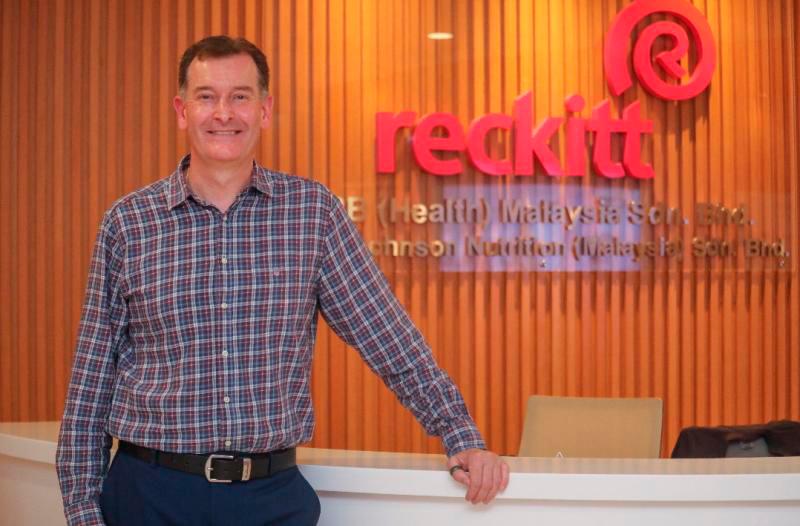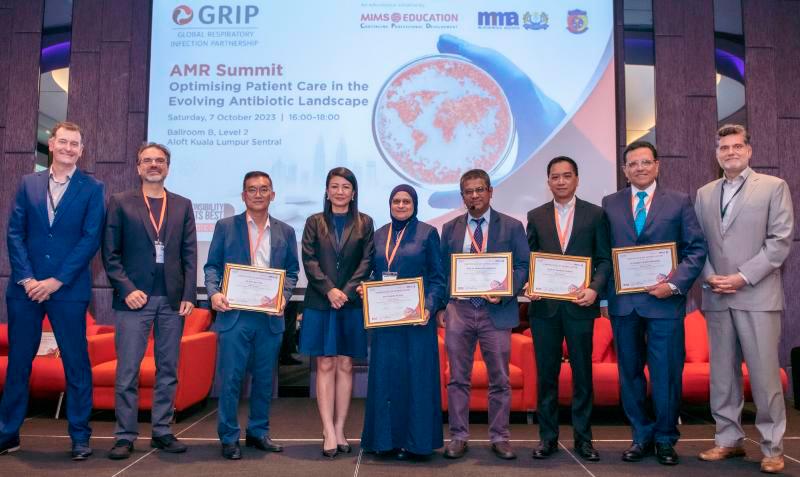KUALA LUMPUR: Some five million people died in 2019 as a consequence of resistance to infections, said Adrian Shephard, the Global Medical Marketing Director for Reckitt.
He said previous estimates had predicted that by 2030, there would be 10 million deaths associated with antibiotic usage.
“Antibiotic resistance is partly caused by its inappropriate use for everyday conditions such as sore throat, cough, and cold. The truth is that antibiotics have zero effect on these conditions,” said Shephard.
As Reckitt is passionate about providing effective solutions for the management of everyday problems that consumers suffer, he said the company noticed the problem of antimicrobial resistance(AMR) emerging 12 years ago.
AMR occurs when bacteria, viruses, fungi and parasites change over time and no longer respond to medicines. This makes infections harder to treat and increases the risk of spreading diseases, contracting severe illness, and ultimately death.
“We noticed that there was so much inappropriate usage of antibiotics for respiratory infections and wanted to know why,” he said.
Shephard said he is confused by countries which had different approaches to using antibiotics and their level of resistance to sore throat.
Hence, Reckitt journeyed over the last 12 years to understand what was driving the difference in inappropriate usage of antibiotics among policymakers, physicians, pharmacists and patients, and how the company could form partnerships with different organisations.
“While we can’t fix everything because there is no single health issue, we can influence antibiotic usage in everyday conditions like sore throats.
“We have effective solutions that are much better for patients and can provide them the relief they are seeking.”
Shephard said everyday conditions like sore throat, cough, and cold are caused by viruses which do not respond to antibiotics, as these “do not work”.
He said Reckitt invests heavily in ensuring its products are evidence-based.
“We have our strepsils max pro product that has undergone 20 clinical studies to prove that it offers effective relief of patients’ sore throats, whether the cause is a viral or bacterial infection.”
Evaluation of clinical studies demonstrate that antibiotics give no better relief for the symptoms than the placebo does, said Shephard. “If patients never get sick, they never need to take an antibiotic.”
The prevention area of infection, he said, is also critical in the battle against AMR, and it remains a pillar that the World Health Organisation (WHO) focuses on.
The prevention of infection is through effective hygiene and sanitation as well as vaccination to ensure that viruses don’t spread in the community.
Moreover, evidence-based medicine is at the heart of what Reckitt is all about as it ensures the products it develops work better than any solutions that might be available.
Shephard said Reckitt is always striving for the best in its innovation pipeline.
Its flurbiprofen products – a nonsteroidal anti-inflammatory drug – dates back to the 1990s. During the mid-90s, the company developed the first clinical studies on flurbiprofen.
“We continue to carry out clinical studies until today to continually improve and understand more about the effectiveness of these products in different patient sets.”
Shephard said Reckitt brings together their experts from the Global Respiratory Infection Partnership (GRIP) to learn from their expertise.
He added that AMR is complex and very difficult to understand. Hence, Reckitt uses GRIP experts to understand the interface between patients and their healthcare professionals.
Reckitt uses its teams within the country and includes local experts who understand the perspective that GRIP’s group brings. This, he said is because “a one-size-fits-all approach just doesn’t work in this complex area”.
GRIP has a “five P” framework. One of the P’s is policy and policymakers are key in controlling which conditions are treated locally, says Shephard.
“We will have discussions with the Health Ministry (MOH) and observe the market around the world regarding guidelines.”
He said it is important for Reckitt and GRIP’s group to be working with the MOH to understand how to meet local requirements.
“All countries have a national action plan when it comes to resistance, and guidelines are a key part of delivering a national action plan.”
Reckitt recognises that in many markets, antibiotics are freely available through a pharmacy environment that doesn’t involve any testing to ensure the antibiotic is right for the patient.
“We believe this is not right and it will lead to inappropriate usage,” he said.
Shephard said the dispensing of antibiotics should be with the appropriate healthcare professional and linked to proper diagnostics.
Reckitt has a partnership with the International Pharmaceutical Federation (IPF) that has been running for the last six years and is trying to advance the standards of care within the pharmacy industry.
He said as an organisation, Reckitt is very patient-centric.
“We do a lot of research with patients, consumers, and healthcare professionals to ensure we understand their needs.”
Shephard said the study on AMR was across 12 countries with 1,000 people per country. Within the study, the 24-43 age group tended to have greater misconceptions than older age ranges.
Reckitt has delivered educational initiatives and is looking to delve deeper with bigger audiences such as policymakers, physicians, specialists, and pharmacists, says Shephard.
He said the company has a partnership with 12 experts who come from different countries as well as different professions.
“We try to enter the countries where we want to make a difference, which is why we are in Malaysia at the moment.”
Reckitt’s marketing director for Malaysia & Singapore, Tiffany Tang, said the GRIP summit is an annual event that focuses on addressing the critical issue of AMR.
“It represents a collaborative and forward-thinking initiative where stakeholders come together to address the urgent global health concern of AMR, with a focus on innovation, sustainability, and responsible practices,” she said.
She said Reckitt’s commitment to combating AMR is its core mission, apart from protecting and improving the health and wellbeing of people around the world.
Tang said the company’s long-term vision involves developing innovative solutions that reduce AMR and tackle Upper Respiratory Tract Infections (URTI) with better sore throat management which only requires symptomatic relief instead of antibiotics.
“Convening the summit allows us to collaborate with global experts,” she said.
The Sore Throat and Antibiotic Resistance (STAR) study that was launched last year, during WHO’s World Antimicrobial Awareness Week, found that 43% of adults believe antibiotics are the most effective.
She said by encouraging people to manage their symptoms using products like Strepsils, they hope to tackle one of the top 10 global public health threats.
These initiatives have an almost global reach except for Russia. GRIP has seen the most significant outcomes of AMR reduction and stakeholder support in Mexico, said Tang.
“We have convened GRIP forums worldwide to ensure alignment with global strategies.
“Through this, Reckitt works closely with international organisations and local health authorities to harmonise our efforts with global initiatives,” said Tang.
She said Reckitt’s broader mission is to support public health systems by giving the public access to information.
“Reckitt plans to further educate and drive awareness of AMR and proper URTI management to more stakeholders around the world such as policymakers and the public.”










